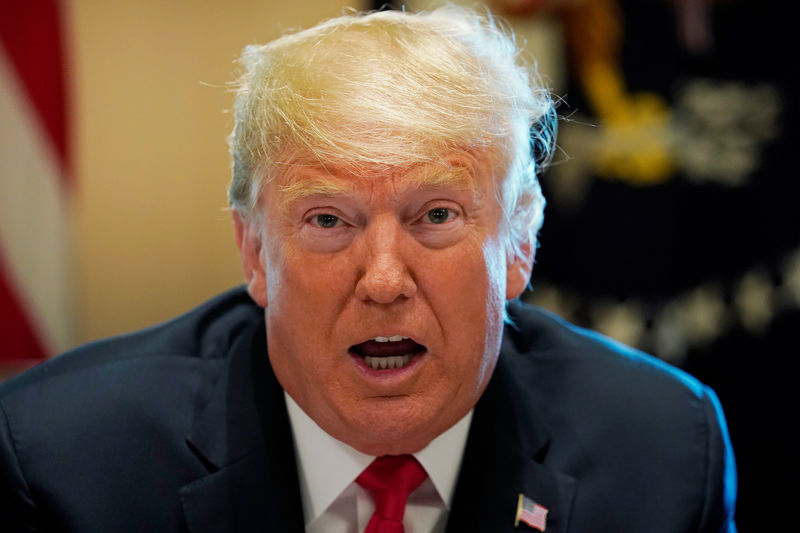Investing.com - Here are the top five things you need to know in financial markets on Friday, May 31:
1. Trump slaps Mexico with 5% tariffs
In a surprising move that would likely derail the U.S.-Mexico-Canada Agreement, U.S. President Donald Trump promised to place 5% tariffs on all Mexican goods exported to the U.S. until the country takes measures to stop immigrants from crossing the American border.
Trump tweeted that the tariff would take effect on June 10 and last “until such time as illegal migrants coming through Mexico, and into our country, STOP”.
The president indicated that tariffs on Mexico would gradually increase if action was not taken. A statement released by the White House specified that they could rise as high as 25% on Oct. 1.
Read more: With Mexico Tariffs, Trump Goes A Step Further In Killing Oil Rally - Barani Krishnan
2. Trade worries hit risk sentiment sending stocks spiraling downwards
Global stocks registered a sharp selloff while sovereign bonds surged on Friday on fears that Trump's shock threat of tariffs on Mexico risked tipping the U.S. into recession while disappointing China data added to the woes.
Asian stocks closed mostly lower with trade worries pummeling sentiment even as data released Friday showed that China’s factory activity in May contracted more than expected.
European shares sank to three-month lows with particular pressure from automakers that have plants in Mexico.
U.S. futures pointed to a sharp decline at the open on Wall Street. Dow futures sank 273 points, or 1.1%, by 5:43 AM ET (9:43 GMT), S&P 500 futures slid 33 points, or 1.2%, while Nasdaq 100 futures traded down 112 points, or 1.6.
U.S. bond yields touched fresh lows and parts of the curve inverted further, seen as a warning signal for recession in the world's largest economy.
3. Uber shares higher after first earnings report as public company
Uber (NYSE:UBER) saw shares move slightly higher in premarket trade Friday after the company delivered mixed earnings in its first report as a public company.
The company’s $1 billion net loss was in line with its own financial guidance and analysts applauded improvements in take rates, the revenue received by the company after subtracting driver or restaurant pay and incentives, along with accelerating revenue growth.
In more downbeat reports, Gap (NYSE:GPS) saw shares plunge as its Old Navy brand posted the weakest sales in three years and the company cut its profit forecast.
Costco (NASDAQ:COST) also saw shares slip despite better-than-expected earnings as the company admitted that prices would likely rise due to tariffs.
Big Lots (NYSE:BIG) will be in focus Friday as it reports earnings ahead of the opening bell.
4. Personal spending, income seen rising
Economic indicators kick off with the most recent numbers on personal income and spending ahead of Friday’s open at 8:30 AM ET (14:30 GMT).
Personal spending is forecast to have risen 0.2% last month, with personal income up 0.3%, according to economists’ forecasts compiled by Investing.com.
The Federal Reserve’s preferred inflation gauge, core personal consumption expenditures, which exclude food and energy, is expected to post a 0.2% rise for the month, but remain at an annual rate of 1.6%.
At 9:45 AM ET (13:45 GMT), the Chicago purchasing managers index (PMI) for May comes out, with economists looking for the measure of Midwest manufacturing activity to tick up to 55.1.
And at 10:00 AM ET (14:00 GMT), the University of Michigan releases its revised consumer sentiment index for May. The index is seen edging down slightly from the preliminary measure to 102.0.
5. Trump’s tariffs on Mexico may make U.S.-China deal more unlikely
Though Trump’s announcement of tariffs on Mexico has shifted the focus of financial media headlines, the ongoing trade dispute between the U.S. and China simmered on the sidelines.
Analysts warned that Trump’s tariffs on Mexico make a deal between Beijing and Washington even more unlikely.
Their argument points to the fact that the recently agreed revisions to the North American trade agreement appear to have been derailed by Trump’s arbitrary decision, lessening the value of reaching any deal.
Dai Xianglong, who headed the People's Bank of China from 1995-2002 and remains an influential figure in China, noted that the U.S. approach to trade talks has been “bullying and America First”.
Dai further indicated that the current situation suggested China's President Xi Jinping and Trump are likely to find it "difficult" to make major progress toward ending their countries' trade war when they meet at a G20 summit in Japan in June.
-- Reuters contributed to this report.
